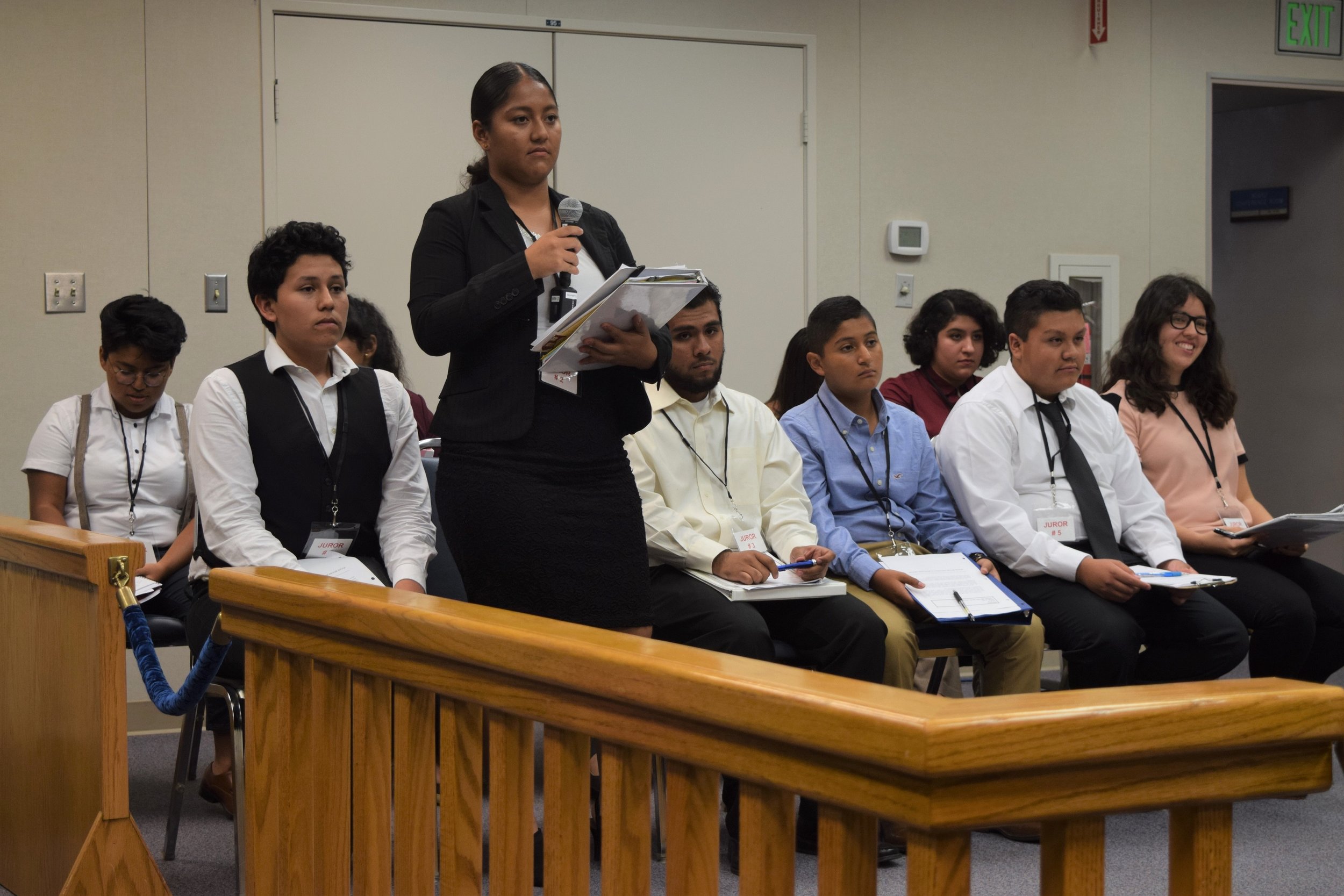Bellflower launches teen court program for juvenile offenders
Bellflower High sophomores Ashley San Pedro Ramirez (left) and Fernando Ruiz speak with Teen Court coordinator Susan Nicoletti before for their first Teen Court on Oct. 5.
BELLFLOWER – More than 100 Bellflower High School students, District administrators, city officials and law professionals on Oct. 5 launched Bellflower Unified’s inaugural Teen Court, with students engaging in a mock trial using facts from a real juvenile court case.
Teen Court members, acting as jurors, cross-examined a student acting as a youth accused of tricking 13 classmates into having a fake candy sprayed into their mouths that was dashed with toilet water.
Members asked the defendant questions about her home and school life, and determined a fitting punishment with assistance from Parents, Educators/Teachers and Students in Action (PESA) Executive Director and lawyer Seymour Amster.
Students were advised to provide sentencing that would improve the defendant’s behavior through curfews, community service, letters of apology and counseling.
Teen Court, started in the 1980s, allows youths charged with offenses to be judged by their peers rather than the state’s juvenile justice system. Participants, who are mostly first-time offenders, have their records cleared six months after participating in Teen Court.
Retired L.A. Superior Court Presiding Judge David S. Wesley, who started the L.A. County Teen Court program 25 years ago, oversaw the Teen Court session. Participants also received assistance from L.A. Superior Court Judge Maria A. Davalos and commissioners Maria J. Santos and Cynthia A. Zuzga.
“This new program will serve as a place where future generations of Bellflower High students will hold their peers accountable, reduce juvenile delinquency, and learn the importance of community involvement and engagement,” Wesley said. “What we hope to get from this program is a commitment from students to service their community.”
Bellflower High sophomore Ashley San Pedro Ramirez prepares to grill a mock trial defendant at her school's inaugural Teen Court on Oct. 5 at the Bellflower Unified School District Office.
Bellflower High sophomore member Ivan Curiel plans to obtain a law degree from UC Berkeley, become a lawyer and return to his community to provide at-risk youth with a chance for rehabilitation. He said participation in Teen Court is an important step toward achieving his goals.
“My participation in Teen Court can help instill positive change in someone’s life – we can save teen offenders from harsh, permanent juvenile justice system punishments by giving them a second chance to rehabilitate,” Curiel said. “Teen Court is the way for me start providing the help I want to give to the community.”
Sophomore Ashley San Pedro Ramirez said receiving guidance from lawyers, judges and commissioners would have a lasting effect on her goal to become a lawyer. She also said the program helps reduce juvenile delinquency.
“Teen Court has shown me that we need to be mindful of what we ask defendants because we want to provide them with the help they need and have them learn from this experience to deter future criminal behavior,” Ramirez said.
The program is an addition to Bellflower High School’s award-winning civics program, which teaches students to engage in research and create solutions to real-world issues.
“It allows our students to put their concepts of justice and government into action and it helps them become civically engaged,” said social science teacher Susan Nicoletti, who oversees the civics and Teen Court programs. “Teen Court helps them participate and learn about the legal system; it gives them a sense of civic duty and it helps open up a wide array of careers to them.”
The Teen Court program will meet monthly, handling about two cases each time. The second session is scheduled for 3:30 p.m. Wednesday, Nov. 1.
“We are very proud that so many of our students are becoming interested in the justice system,” Superintendent Dr. Brian Jacobs said. “The Teen Court program does an amazing job at showing our students a first-hand view of how the justice system works and shapes a community.”


